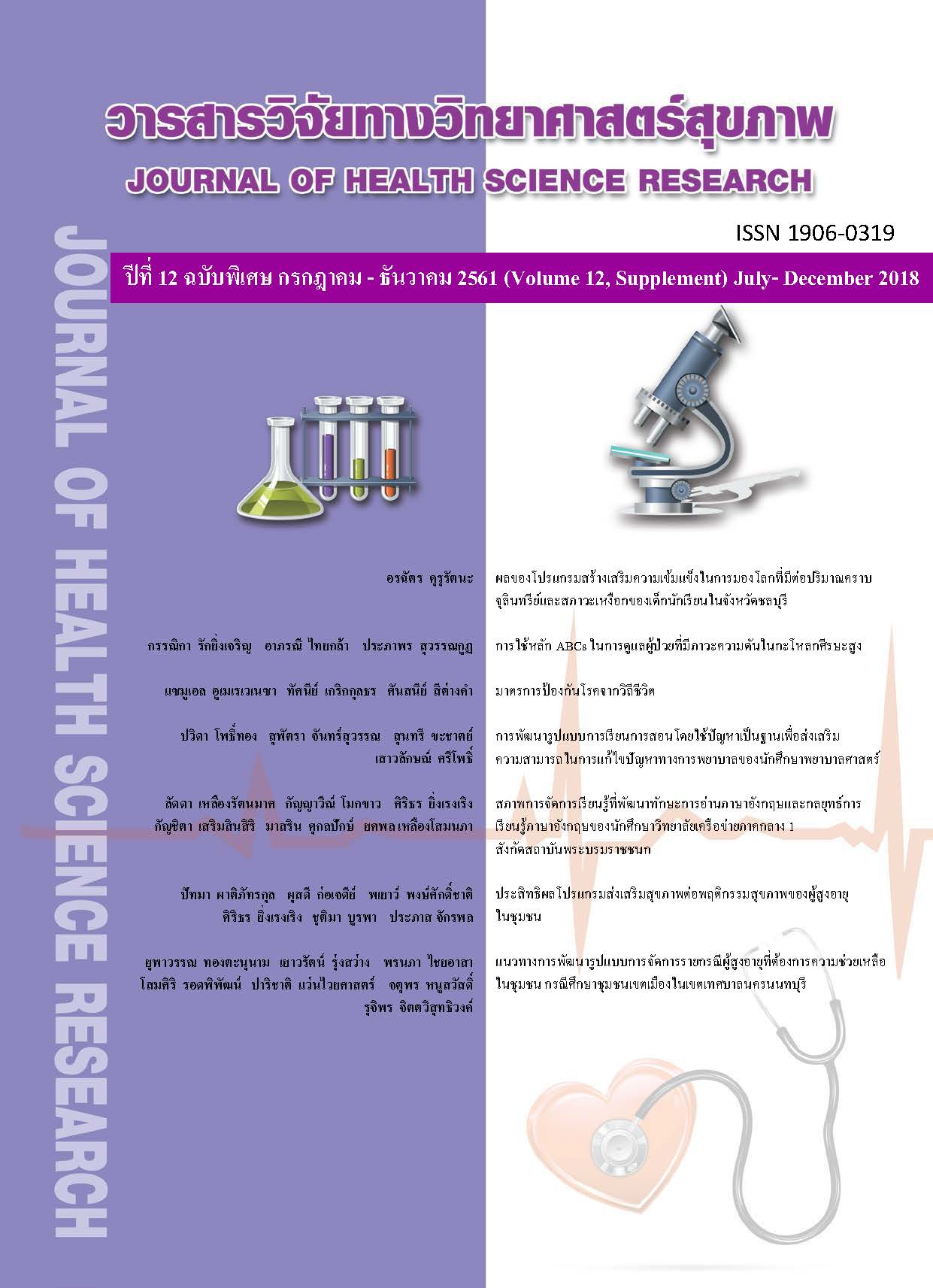มาตรการป้องกันโรคจากวิถีชีวิต
Main Article Content
บทคัดย่อ
บทความวิชาการนี้มีวัตถุประสงค์ เพื่อส่งเสริมให้เกิดการป้องกันและควบคุมโรคที่เกิดจากวิถีชีวิต ซึ่งเป็นภัยคุกคามต่อสุขภาพ เป็นสาเหตุของภาวะทุพพลภาพและการเสียชีวิต รวมถึงส่งผลต่อภาวะเศรษฐกิจและปัญหาสังคมในระดับโลก บทความนี้กล่าวถึงทฤษฎีพฤติกรรมตามแผน (Theory of planned behavior) ที่พัฒนามาจากทฤษฎีการกระทำด้วยเหตุผล (Theory of reasoned action) ซึ่งอธิบายว่า การเลือกปฏิบัติพฤติกรรมของบุคคล ขึ้นอยู่กับความสนใจต่อสิ่งนั้น (intention) ยิ่งบุคคลมีความสนใจมากจะมีแนวโน้มปฏิบัติพฤติกรรมนั้นมากขึ้น โดยความสนใจของบุคคล ถูกกระตุ้นจาก 3 องค์ประกอบหลัก ได้แก่ ทัศนคติที่มีต่อพฤติกรรม บรรทัดฐานของบุคคลที่มีต่อพฤติกรรม และการรับรู้ถึงการควบคุมพฤติกรรมตนเอง ดังนั้นบุคคลที่สนใจในพฤติกรรมเสี่ยงต่อสุขภาพ จึงมักมีโอกาสได้รับผลกระทบทางสุขภาพจากการดำเนินชีวิตหรือการปฏิบัติพฤติกรรมนั้นๆ
โรคที่เกิดจากวิถีชีวิตหรือโรคพฤติกรรม เป็นภัยเงียบที่บ่อยครั้งผู้ป่วยไม่สามารถประเมินอาการได้ด้วยตนเอง คนส่วนใหญ่จึงป่วยเป็นโรคโดยไม่รู้ตัว โดยเฉพาะอย่างยิ่งในกลุ่มวัยผู้ใหญ่และผู้สูงอายุ กรอบแนวคิดของบทความนี้ได้นำเสนอพฤติกรรมเสี่ยงต่อสุขภาพ ผลกระทบที่เกิดขึ้น และวิธีการป้องกันโรคจากวิถีชีวิต ภายใต้การนำใช้ทฤษฎีพฤติกรรมตามแผนในการสนับสนุนให้มีการป้องกันและควบคุมโรคจากวิถีชีวิต ส่งเสริมให้บุคคลสามารถดูแลสุขภาพตนเองในการป้องกันและควบคุมโรคที่เกิดจากวิถีชีวิตได้
Article Details
บทความที่ได้รับการตีพิมพ์เป็นลิขสิทธิ์ของวิทยาลัยพยาบาลบรมราชชนนี จังหวัดนนทบุรี
ข้อความที่ปรากฏในบทความแต่ละเรื่องในวารสารวิชาการเล่มนี้เป็นความคิดเห็นส่วนตัวของผู้เขียนแต่ละท่านไม่เกี่ยวข้องกับวิทยาลัยพยาบาลบรมราชชนนี จังหวัดนนทบุรี และคณาจารย์ท่านอื่น ในวิทยาลัยฯ แต่อย่างใด ความรับผิดชอบองค์ประกอบทั้งหมดของบทความแต่ละเรื่องเป็นของผู้เขียนแต่ละท่าน หากมีความผิดพลาดใด ๆ ผู้เขียนแต่ละท่านจะรับผิดชอบบทความของตนเองแต่ผู้เดียว
References
2. UN Chronicle. Lifestyle diseases: An economic burden on the health services. [Internet]. 2010 [cited 2018 May 16]; Available from: https://unchronicle.un.org/article/lifestyle-diseases-economic-burden-health-services/
3. Wadden TA, Butryn ML, Wilson C. Lifestyle modification for the management of obesity. Gastroenterology. 2007;133(1):2226–38.
4.Pappachan MJ. Increasing prevalence of lifestyle diseases: High time for action. Indian J Med Res. 2011;134:143–5.
5. Aikman SN, Doyle-Portillo S, Verhaeghen P, Simmons N. The effect of instruction point of view on self-efficacy for performing breast self-exams. Am J Health Educ. 2017;48(1):1-10.
6. Ajzen I. The theory of planned behavior: Reactions and reflections. Psychol Health. 2011;26(9):1113-27.
7. Kinra S, Bowen LJ, Lyngdoh T, Prabhakaran D, Reddy KS, Ramakrishnan L, et al. Sociodemographic patterning of non-communicable disease risk factors in rural India: A cross sectional study. BMJ. 2010;341:c4974.
8. Ghaffar A, Reddy KS, Singhi M. Burden of non-communicable diseases in South Asia. BMJ. 2004;328(7443):807-10.
9. Armitage CJ. Can the theory of planned behavior predict the maintenance of physical activity? Health Psychol. 2005;24(3):235-45.
10. Ellen PS, Madden TJ. The impact of response format on relations among intentions, attitudes and social norms. Market Lett. 1990;1(2):161-70.
11. Fishbein M, Ajzen I. Belief, attitude, intention, and behavior: An introduction to theory and research. Reading, MA: Addison-Wesley; 1975.
12. Fishbein M, Ajzen I. Attitudes and voting behavior: An application of the theory of reasoned action. In: Stephenson GM, Davis JM, editors. Progress in applied social psychology. Vol. 1. London: Wiley; 1981. p.253-313.
13. Madden TJ, Ellen PS, Ajzen I. A comparison of the theory of planned behavior to the theory of reasoned action. Pers Soc Psychol Bull. 1992;18(1):3-9.
14. Sadeh N, Baskin-Sommers A. Risky, Impulsive, and Self-Destructive Behavior Questionnaire (RISQ): A validation study. Assessment. 2017;24(8):1080-94.
15. Sharma A. Global research priorities for noncommunicable diseases prevention, management, and control. Int J Noncommun Dis. 2017;2(4):107-12.
16. Vasan RS, Larson MG, Leip EP, Kannel WB, Levy D. Assessment of frequency of progression to hypertension in non-hypertensive participants in the Framingham. Heart Study: A cohort study. Lancet. 2001;358(9294): 1682-6.
17. Saravitee N, Janesawang D, Thongkhambanchong S. Causal model of exercise behaviors of the elderly based on theory of planned behavior. Journal of Humanities and Social Sciences Mahasarakham University. 2017;36(1):25-32. (in Thai).
18. Roncancio AM, Ward KK, Sanchez IA, Cano MA, Byrd TL, Vernon SW, et al. Using the theory of planned behavior to understand cervical cancer screening among Latinas. Health Educ Behav. 2015;42(5):621-6.
19. De Vet E, de Nooijer J, de Vries NK, Brug J. Comparing stages of change and behavioral intention to understand fruit intake. Health Educ Res. 2007;22(4):599-608.

